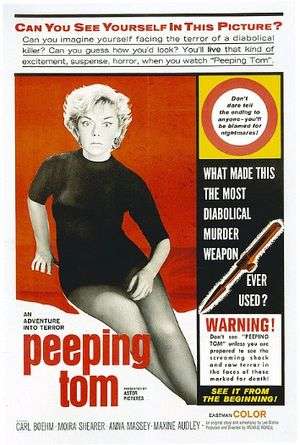Peeping Tom (film)

Look out! You're being watched!
Peeping Tom is a 1960 British film by the legendary director Michael Powell. The movie can be considered, along with Psycho, as a precursor of the slasher genre. It also triggered a little controversy.
Mark Lewis is a man who tends to court women, usually prostitutes. They usually consider him some kind of a creep with his obsession of bringing his camera with him everywhere and filming their encounters. But they don't realize the kind of deal he has in mind until they're alone and he kills them with his tripod, but not before frightening them with something that makes them cringe with terror.
Turns out he works with a film crew and is a filmmaker aspirant. Some day he engages in conversation with the family downstairs, and befriends their daughter Helen, eventually forming relationship with her. He shares some of his home movies with her, along with his childhood problems created by his father. Turns out he used his son as an experiment in psychological fears putting him in stressful situations and filming everything with his camera.
The police start suspecting a man who barely talks with other people and has his camera always running (that would be Mark), and eventually they find enough evidence to convict the man. Mark, knowing this, takes cover in his house and when Helen follows him, trying to help him, she finally witnesses what he has been doing. He’s making a documentary, like his father before him, of the fear of death, using a mirror to show the soon-to-be victims their faces full of terror. When the police find him, he commits suicide, giving his documentary an appropriate ending.
The film made such a controversy that it practically destroyed Powell's career. Eventually it was Vindicated by History and now his considered one of the best films ever.
A personal favorite of Martin Scorsese. It's also one of the Greatest Films of Roger Ebert.
- Abusive Parents: His father is the main reason Mark is the way he is.
- Bowdlerise: When it was first released, the censors cut shots of the murders, nudity and Mark’s suicide.
- Camera Fiend: Of course.
- Creator Cameo: Director Powell plays Mark's father.
- Cruel and Unusual Death: To die watching the reflection of your horrified face seems to be horrible.
- Disposable Sex Worker
- Driven to Suicide
- Fan Service: The nudity in this film, tame for modern standards, shocked the censors in 1960.
- For Science!: It seems to be his father's motto.
- Foreshadowing:
“He has his father's eyes.”
- Freudian Excuse
- Improbable Weapon User: Who could have thought of using a tripod's leg as a butcher’s knife?
- In the Blood
- Intro-Only Point of View
- Mad Scientist
- The Peeping Tom: Mark.
- POV Cam: Used for the murder scenes, and justified as they are from Mark's camera.
- Psychological Horror
- Slasher Movie: Possibly a Trope Maker.
- Snuff Film: Mark's documentary.
- Stuffed Into The Coffin: Only because Mark needed to dispose of the body quick.
- Take That: The character of the director is supposed to be a parody of mogul John Davis (the director's name is Don Jarvis, making it not too subtle).
- There Are No Therapists: Averted; there is a psychiatrist, but it's more helpful to the police than to Mark.
- Trailers Always Spoil: And so do posters. As you can see in the poster above, it indirectly reveals the secret weapon of Mark.
- Ur Example: Of the slasher flick.
- Woobie, Destroyer of Worlds: Mark, considering his massive Freudian Excuse.
- You Bastard: You're watching a film about murderous voyeurism-- to get a thrill out of the story that unfolds.